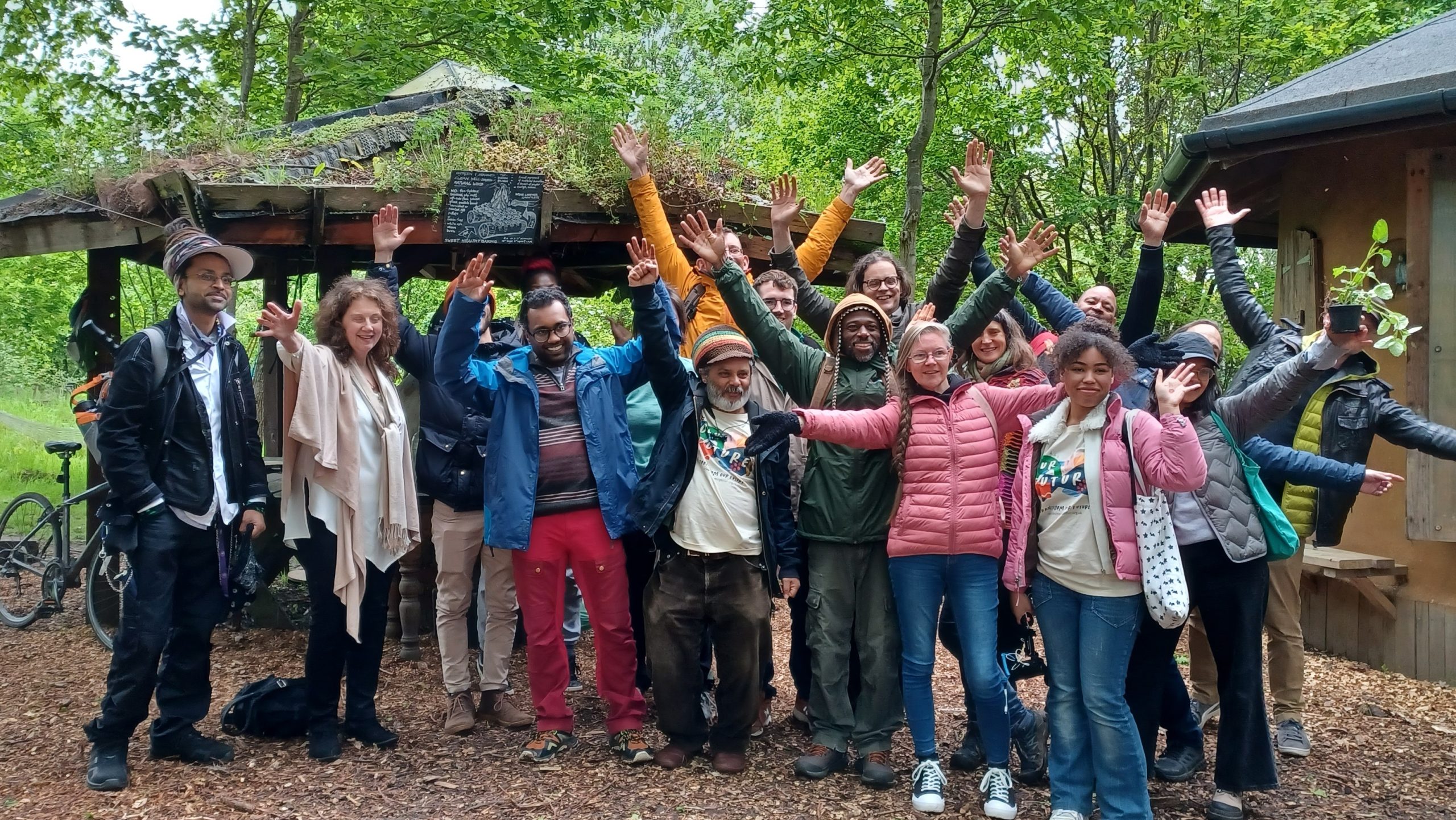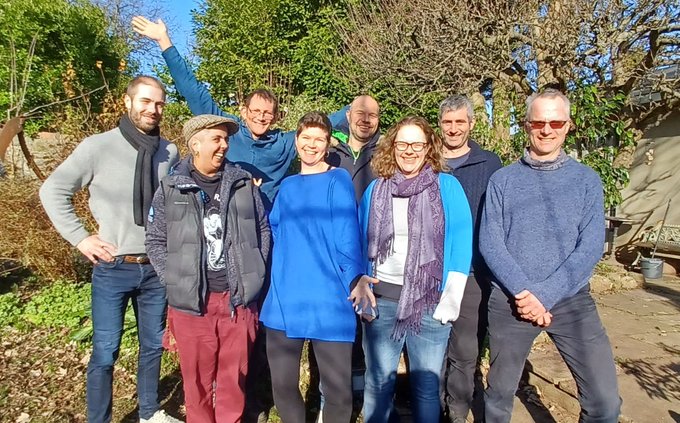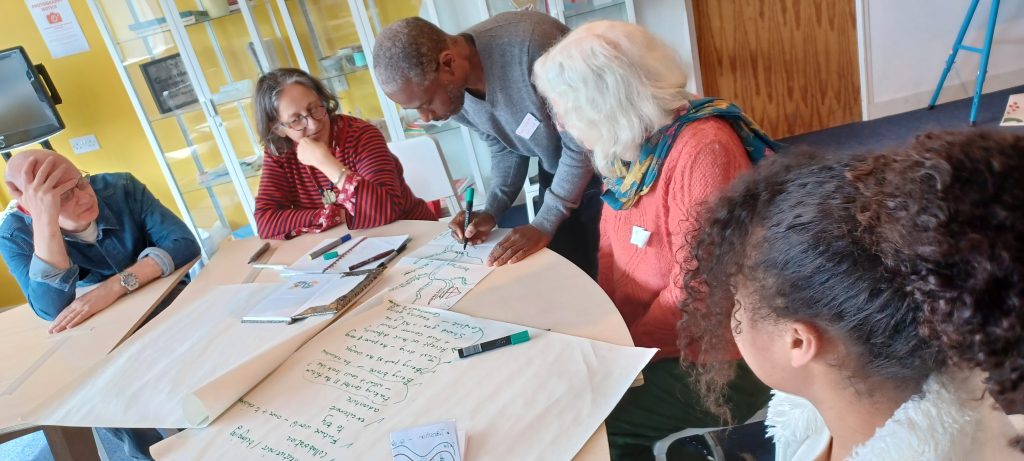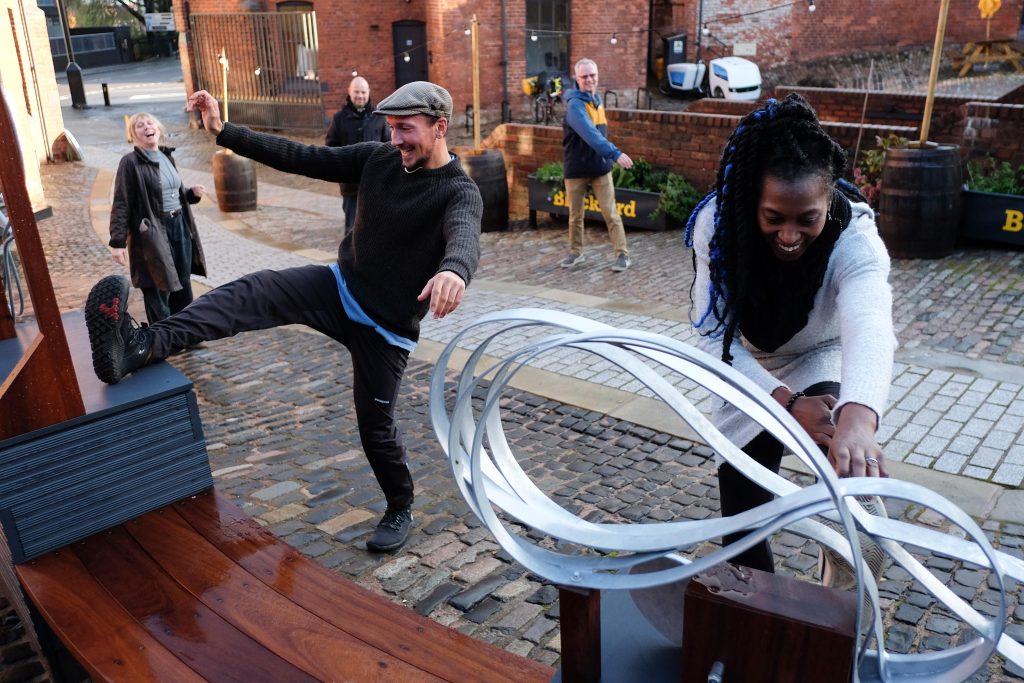The Story of our Second Year

9 January 2024
9 minute read
In a year of bleak headlines about war, record temperatures and the struggles for many getting through the cost of living crisis, it’s easy to be discouraged and overwhelmed.
Many have discovered that joining with others and taking practical action at a local scale not only gives them hope and purpose, but can achieve real, measurable change in their local community. It doesn’t make the challenges vanish – but it can help us sustain our efforts to face them. It can help us glimpse a better future world and embolden our hope and resolve to keep working towards it. It can help unearth new solutions – however small – which can inspire others.
The Transition movement, a network of local groups reimagining and rebuilding their world from the ground up, has sought to foster, connect and inspire that practical, community-led action for almost 20 years now. You are part of a movement active in 50 countries, exploring new ways to organise and bring about change.
Transition Together is a support project for the Transition Movement in England, Wales and now Northern Ireland, and working alongside our partners in Scotland, the Scottish Communities Climate Action Network (SCCAN). We are funded to nurture and grow community-led change by The National Lottery Community Fund’s Growing Great Ideas programme.
How have we been doing this?

Transition Together’s team is made of eight core staff, two new in post and all working part time to balance involvement in their own communities. This grounds our work, but also presents capacity challenges – as we try to remember that though the opportunities and needs are great, our team is small. For each of us, it is a privilege to be in service to you – committed, creative and passionate Transitioners working hard, usually as volunteers, in your own communities.
We are constantly astounded by what Transition groups can achieve with your local knowledge, passion, vision and just a little resource. At the end of 2022, we distributed £160,000 through our small seed funding grants scheme, made possible by The National Lottery Community Fund. Seventy groups used the grants to unlock community-led change across England and Wales throughout 2023.
We know seed funding ignites new ideas, projects and even the formation of new Transition groups. Over the past year, new community spaces, social enterprises and youth-led projects have all emerged from these grants. In autumn 2023, we opened the biggest round yet, with £270,000 funding to distribute. Over the next few weeks our seed funding team will contact groups that applied. We cannot wait to see what you’ll make happen in 2024.
At the heart of our project is supporting Transitioners and groups to grow capacity, skills and connections – to be even more effective and impactful in your communities. We introduced new training programmes: Launch, designed for new and emerging Transition groups, and Thrive, tailored to help established groups strengthen,revitalise and manage change. Our new Training and Group Support lead, Daniel Balla, started last week and will be enhancing these courses in order to deliver them again soon.
We recognise those working for community-led change have huge wisdom, experience and knowledge, and often face the same questions and challenges. We established regular Skillshares as a rich forum to share that across the movement and help us all become more effective. So far, we’ve heard from 18 different groups across the country, on topics from involving more people, addressing the cost of living crisis, getting our voices heard online and in the media, mapping networks for change, working with councils and raising funds.
We continue to build and nurture our online community of Transitioners and others working for community-led change on our Vive platform. As the membership has grown, so have the spaces for people to connect and collaborate, including user-led spaces to support communities of practice and the Scottish regions. We’re really seeing the benefit of Vive as a feedback loop to inform our wider work, with peer-to-peer support questions helping us to plan skillshares, training and resources. In the coming year we will be experimenting with private spaces on Vive for local groups to have access to online organising tools, so it’s a great time to join up if you haven’t already.

We heard feedback that after the pandemic years and inspiring online events, people were ready to gather in person. Working with the movement, we supported two Regional gatherings in May and June 2023, and it was revitalising to be together and see in person innovative Transition projects and the impact they are making. In 2024, watch out for our deep dives exploring how to Work with Councils and Transition Alive! – a series celebrating and exploring how Transition groups can scale up our impact, rise to the challenge of justice and renew our shared vision for the future. You’ll find all our events here.
This year, our team continued to explore how and why it matters to build social justice into work for community-led change. We recognised that the Transition we work for must be just, for everyone, and if our project was to contribute meaningfully and practically, we needed greater capacity and focus on this theme throughout our work.
This led to the creation of a new Just Transition Lead role and, in October, Rona Hardie joined us. So far, we’ve started an internal anti-oppression process in our staff team and updated our seed funding assessment to increase the value placed on social justice. We are also planning a programme of Just Transition webinars and training, to help groups explore these complex issues and how they can respond in their local context. In 2024, Rona will work with the rest of the team to put social justice and equity at the heart of our work, and help the movement explore the relevance of Just Transition for community-led change.

Nurturing a process for a representative hub for Transition in England and Wales has been a core goal of Transition Together. In our second year, a caretaker group undertook an exploration of what this could mean and how it could work in practice. The need for equity and inclusion to be at the heart of Transition was the first of seven essential ingredients they identified and shared with the movement in the autumn. Now, you are invited to respond and shape the next stage of this process before three coordinators are recruited to start building the hub in practice. Find out more.
We know we are part of an ecosystem of change. We continue to support the CTRLshift network, developing an action database to be rolled out at the national level of scale to bring organisations together to explore synergies and opportunities. At a local level, innovative prototype projects are experimenting with building community power in a variety of ways and also establishing a community of practice to support this activity. We contributed to the Schumacher Institutes Community Climate Action Toolkit, and are collaborating with them on a guide for communities systems change, which will be published later this year.
We continue to work in close partnership with the Transition hub for Scotland, Scottish Communities Climate Action Network, meeting regularly and sharing ideas and opportunities. In the autumn, our funder agreed we could extend our activities, including seed funding, to Northern Ireland. We know there are already great things happening at the grassroots there, and it’s been wonderful to see more groups join the network and interest in forming new groups there.
Where next?
The Growing Great Ideas programme was closed in November 2021. Our grant had a three-year break point at which the funding would be reviewed, but as the scheme is no longer live then the opportunity for continuation funding has now ceased. Subsequently, our grant will be coming to an end and The National Lottery Community Fund is supporting us as this happens to work out future plans and funding needs and explore other options.
As part of this they have uplifted our current grant – a welcome move – which will enable us to continue our project for a short time until March 2025. This will allow us to continue to offer training and support to groups working for community-led change for an additional seven months, to consolidate the work we’ve begun and to give time and space for a meaningful dialogue with the movement about how we plan to build on this first phase.
We see immense value in the work the movement is doing – and in resourcing the infrastructure to support those local groups working hard and effectively on the ground. A priority for the coming year will be to secure the resources needed to continue and build on it, shaping that with the movement and we will soon be sharing more details of this.
There has never been a more urgent time to unlock community action in response to the multiple serious crises we face. To plan for and better understand the transformational changes we want to contribute to, we continue to develop a 3D approach to explore how we can deepen, lengthen and widen our impact. We’ve helped groups do that in a simple way too, through this workshop and tool.
You can help us to enhance our knowledge of Transition work on the ground by updating your group’s profile on the Transition groups database, as 113 groups have already done. This helps members of the public to find and connect with you, and gives us all a more accurate and up to date picture of the current activities, size and scale of Transition groups, allowing us to plan better how to support the movement.
We use our newsletter, website, Instagram, Facebook, Twitter and Mastodon channels to share ideas, examples and practical information to amplify the amazing work already happening, featuring some 80 Transition projects last year. We know this gives communities the solutions, information and inspiration to try out new initiatives and approaches in their place. In 2024, we’ll speak more deliberately to external audiences, growing their understanding of what Transition is and inviting more people to join us on the journey.
To find out about the first year of our project, read here.